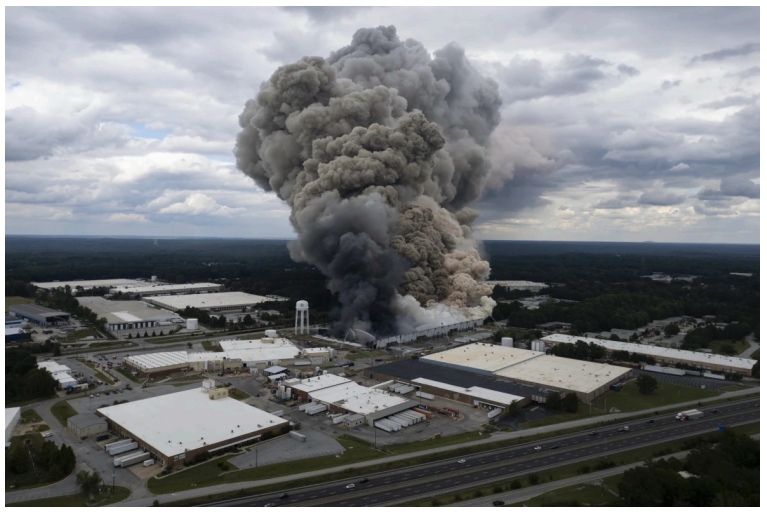Class Actions Filed Over KIK Bio-Lab Chemical Fire at Georgia Plant
Long v. Bio-Lab Inc. et al.
Filed: September 30, 2024 ◆§ 1:24-cv-04411
At least three class action lawsuits have been filed over a massive chemical plant fire in Georgia.
At least three proposed class action lawsuits have been filed over a massive chemical plant fire in Georgia this week that led officials to issue evacuation and shelter-in-place orders for more than 90,000 residents as a plume of chlorine-filled smoke billowed from the facility.
Get class action lawsuit news sent to your inbox – sign up for ClassAction.org’s free weekly newsletter.
The class actions were filed on September 30 in Atlanta federal court against pool and spa chemicals maker Bio-Lab, Inc. and KIK Consumer Products, and allege the companies were negligent and/or reckless in failing to prevent the chemical inferno at the KIK Bio-Lab facility in Conyers.
One suit charges that Bio-Lab did not have an adequate fire protection system in order to quickly and effectively extinguish fires at the facility and prevent dangerous chemical reactions. The class action suits each allege that Bio-Lab and KIK failed to take reasonable measures to prevent and/or mitigate the chemical fire and subsequent toxic smoke plume.
“At all relevant times, it was foreseeable to Defendants that their failures would seriously injure Plaintiffs and the other Class Members,” one suit contests.
The September 29 fire caused hazardous chemicals, including chlorine-based pool chemicals, to spew into the air and throughout the surrounding community, and the smoke from the blaze included toxic chlorine gas that can irritate the eyes, skin and respiratory system, the cases relay. The class action suits also emphasize that nearby residents have suffered damages including the loss of use and enjoyment of their properties and incurred clean-up costs and reduced property values.
“Defendants’ recklessness has upended the lives of nearly 100,000 Georgians, who must now fear for their health and the habitability of their neighborhoods,” one lawsuit scathes, alleging the companies have failed to act responsibly despite a history of similar explosions, including several at the Conyers facility.

Days ago, around 5:00 a.m., a building sprinkler system activated and sprayed water onto the reactive chemicals, triggering explosions. Though the initial fire subsided, it reignited hours later and quickly grew catastrophic as traditional fire-fighting methods are ineffective against water-reactive chemicals.
The Georgia chemical fire, which ultimately caused a complete collapse of the building, produced immense walls of smoke rife with chlorine, hydrochloric acid, hydrogen cyanide, hydrogen bromide and phosgene, chemicals that one suit stresses can cause severe, life-changing injuries with even short-term exposure.
Thousands of Rockdale County residents physically present in Conyers were ordered to evacuate, while all county residents were ordered to shelter in place and turn off all air conditioners and ventilation systems.
One class action notes that a 2004 warehouse fire at the Conyers facility injured 28 people and produced a plume of toxic chlorine that affected residents within 50 miles of the plant and prompted evacuation orders for those within a 1.5-mile radius. Per the case, that fire was caused by an explosion “fueled by 250,000 pounds of dry chlorine pellets” and resulted in a $7 million settlement with residents.
In 2016, a fire started in a storage shed at the Conyers plant and was only noticed and reported because a resident close by smelled smoke and chemicals and alerted authorities, the filing goes on. That fire, similarly, was fueled by chlorine pellet reactions and prompted more evacuation orders in the area.
Four years later, a water line leak flooded part of the plant and reacted with trichloroisocyanuric acid at the facility, producing hazardous fumes and a plume of chemicals. The incident caused chlorine levels in the air at nearby properties to balloon to 12 times the permissible exposure limit and caused more than $1 million in property damage and the hospitalization of nine firefighters, the complaint states.
The Georgia chemical fire lawsuits look to cover all people and businesses in Rockdale County and surrounding communities subject to the evacuation and shelter-in-place orders issued as a result of the toxic smoke and debris from the Conyers plant—and all those exposed to chlorine and other hazardous chemicals from the facility.
Check out our class action rebates page full of open class action settlements.
Video Game Addiction Lawsuits
If your child suffers from video game addiction — including Fortnite addiction or Roblox addiction — you may be able to take legal action. Gamers 18 to 22 may also qualify.
Learn more:Video Game Addiction Lawsuit
Depo-Provera Lawsuits
Anyone who received Depo-Provera or Depo-Provera SubQ injections and has been diagnosed with meningioma, a type of brain tumor, may be able to take legal action.
Read more: Depo-Provera Lawsuit
How Do I Join a Class Action Lawsuit?
Did you know there's usually nothing you need to do to join, sign up for, or add your name to new class action lawsuits when they're initially filed?
Read more here: How Do I Join a Class Action Lawsuit?
Stay Current
Sign Up For
Our Newsletter
New cases and investigations, settlement deadlines, and news straight to your inbox.
Before commenting, please review our comment policy.